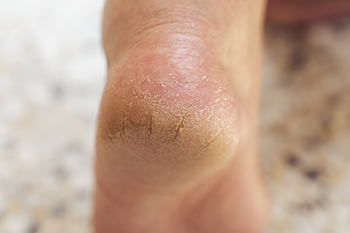Connect With Us
Blog

Cracked heels are a common foot issue, but in individuals with diabetes, they can signal more serious concerns. Diabetes often leads to dry skin due to reduced oil and sweat gland function, especially in the feet. This dryness increases the risk of skin cracking, particularly around the heels where pressure is greatest. Poor circulation and nerve damage associated with diabetes can prevent individuals from noticing early signs of skin breakdown. When cracks deepen, they can allow bacteria to enter, raising the risk of infection. Healing may also be slower due to impaired blood flow. Proper foot care is essential for people with diabetes. If you have diabetes and have developed cracked heels, it is suggested that you are under the care of a podiatrist who can treat foot problems and help you to manage this condition.
Diabetic foot care is important in preventing foot ailments such as ulcers. If you are suffering from diabetes or have any other concerns about your feet, contact Wendy L. Grossman, DPM from New Jersey. Our doctor can provide the care you need to keep you pain-free and on your feet.
Diabetic Foot Care
Diabetes affects millions of people every year. The condition can damage blood vessels in many parts of the body, especially the feet. Because of this, taking care of your feet is essential if you have diabetes, and having a podiatrist help monitor your foot health is highly recommended.
The Importance of Caring for Your Feet
- Routinely inspect your feet for bruises or sores.
- Wear socks that fit your feet comfortably.
- Wear comfortable shoes that provide adequate support.
Patients with diabetes should have their doctor monitor their blood levels, as blood sugar levels play such a huge role in diabetic care. Monitoring these levels on a regular basis is highly advised.
It is always best to inform your healthcare professional of any concerns you may have regarding your feet, especially for diabetic patients. Early treatment and routine foot examinations are keys to maintaining proper health, especially because severe complications can arise if proper treatment is not applied.
If you have any questions please feel free to contact our office located in Bloomfield, NJ . We offer the newest diagnostic and treatment technologies for all your foot and ankle needs.

When it comes to improving heart health, we often think about diet and cardio workouts. But what is happening below your ankles can also play a surprising role. Studies show that when exercise is paired with custom foot orthotics, the benefits extend beyond muscle tone and endurance. People experience better balance in their cardiovascular system, including more stable blood pressure and improved patterns in heart rate responses. Proper support from custom orthotics helps align the body during movement, reducing physical stress and promoting more efficient circulation. This combination encourages healthier signals between the heart and the nervous system, supporting overall wellness. If you have been working hard to improve your fitness but still struggle with issues like fatigue, lightheadedness, or inconsistent blood pressure, it could be time to look at your feet. For a tailored solution that supports your entire body, it is suggested that you see a podiatrist for an evaluation and personalized treatment.
If you are having discomfort in your feet and would like to try orthotics, contact Wendy L. Grossman, DPM from New Jersey. Our doctor can provide the care you need to keep you pain-free and on your feet.
What Are Orthotics?
Orthotics are inserts you can place into your shoes to help with a variety of foot problems such as flat feet or foot pain. Orthotics provide relief and comfort for minor foot and heel pain but can’t correct serious biomechanical problems in your feet.
Over-the-Counter Inserts
Orthotics come in a wide variety of over-the-counter inserts that are used to treat foot pain, heel pain, and minor problems. For example, arch supports can be inserted into your shoes to help correct overarched or flat feet, while gel insoles are often used because they provide comfort and relief from foot and heel pain by alleviating pressure.
Prescription Orthotics
If over-the-counter inserts don’t work for you or if you have a more severe foot concern, it is possible to have your podiatrist prescribe custom orthotics. These high-quality inserts are designed to treat problems such as abnormal motion, plantar fasciitis, and severe forms of heel pain. They can even be used to help patients suffering from diabetes by treating foot ulcers and painful calluses and are usually molded to your feet individually, which allows them to provide full support and comfort.
If you are experiencing minor to severe foot or heel pain, it’s recommended to speak with your podiatrist about the possibilities of using orthotics. A podiatrist can determine which type of orthotic is right for you and allow you to take the first steps towards being pain-free.
If you have any questions please contact our office located in Bloomfield, NJ . We offer the newest diagnostic and treatment technologies for all your foot and ankle needs.

Wearing the wrong running shoes can lead to several issues that affect comfort, performance, and overall foot health. Poor performance is a common sign, as improper support or fit can cause discomfort and inefficiency while running. Runners may experience fatigue more quickly and struggle with maintaining proper form. Premature wear and tear on the shoes can also indicate a poor match, as excessive breakdown of the sole or cushioning suggests inadequate shock absorption or improper foot alignment. Injury is another major concern, as wearing ill-fitting shoes can contribute to blisters, shin splints, knee pain, or even stress fractures. Persistent discomfort, muscle soreness, and joint pain may develop over time. If you have developed foot conditions from wearing the wrong type of running shoe, it is suggested that you visit a podiatrist who can treat various foot ailments, and guide you on what type of shoes to buy for your desired style of running.
If you are a runner, wearing the right running shoe is essential. For more information, contact Wendy L. Grossman, DPM from New Jersey. Our doctor can provide the care you need to keep you pain-free and on your feet.
Choosing the Right Running Shoe for Your Foot Type
To increase performance and avoid the risk of injury, it is important to choose the right running shoe based on your foot type. The general design of running shoes revolves around pronation, which is how the ankle rolls from outside to inside when the foot strikes the ground.
- Neutral runners are able to choose from a wide variety of shoes, including minimalist shoes or even going barefoot.
- Runners who overpronate, or experience an over-abundance of ankle rolling, should choose shoes that provide extra motion control and stability.
- Runners who underpronate, or supinate, have feet that have high arches and lack flexibility, preventing shock absorption. They require shoes with more flexibility and cushion.
If you have any questions please feel free to contact our office located in Bloomfield, NJ . We offer the newest diagnostic and treatment technologies for all your foot and ankle needs.
Blog Archives
- April 2025
- March 2025
- February 2025
- January 2025
- December 2024
- November 2024
- October 2024
- September 2024
- August 2024
- July 2024
- June 2024
- May 2024
- April 2024
- March 2024
- February 2024
- January 2024
- December 2023
- November 2023
- October 2023
- September 2023
- August 2023
- July 2023
- June 2023
- May 2023
- April 2023
- March 2023
- February 2023
- January 2023
- December 2022
- November 2022
- October 2022
- September 2022

